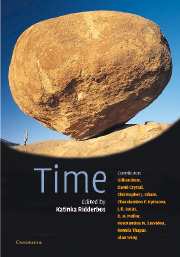Introduction
Published online by Cambridge University Press: 21 October 2009
Summary
What is time? We are all too familiar with our inability to escape the inexorable passage of time, and yet we are hard-pressed to say what time is. St Augustine famously replied to this question by saying that he knew the answer as long as no one asked him for it, but that as soon as he tried to explain it he no longer knew. Are we now, more than a millennium and a half after St Augustine found himself in this unfortunate position, better equipped to shed some light on the nature of time?
St Augustine's problem stems at least in part from the fact that the question of the nature of time is multifaceted in a manner in which few other subjects are. Each questioner will emphasise a different aspect of the question ‘What is time?’. So, from different perspectives, we find ourselves asking whether time is linear or cyclic, whether it is endless, whether it is possible to travel in time, how the experience of the flow of time arises, how our own internal clocks are regulated and how our language captures the temporality of our existence.
The contributions to this volume reflect this multifacetedness. No attempt is made to devise a single conclusive answer to the question of the nature of time. Instead, eight eminent researchers explore how investigations in their respective fields impinge on questions about the nature of time.
- Type
- Chapter
- Information
- Time , pp. 1 - 5Publisher: Cambridge University PressPrint publication year: 2002



